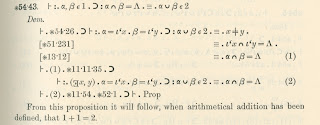 On page 86 of the second volume of Prinicipia Mathematica, Whitehead and Russell provide the final steps of their proof that 1+1 does indeed equal 2. Accompanying this is the statement that "the above proposition is occasionally useful." They had initially alluded to this on page 379 of volume one. "From this proposition it will follow, when arithmetical addition has been defined, that 1+1=2."
On page 86 of the second volume of Prinicipia Mathematica, Whitehead and Russell provide the final steps of their proof that 1+1 does indeed equal 2. Accompanying this is the statement that "the above proposition is occasionally useful." They had initially alluded to this on page 379 of volume one. "From this proposition it will follow, when arithmetical addition has been defined, that 1+1=2."Published over the course of three years (1910, 1912, & 1913), Principia Mathematica is a three volume work by Alfred North Whitehead and Bertrand Russell that attempted to provide a fundamental foundation for all mathematics based on the stated goals of utilizing the most minimal set of "undemonstrated propositions," a "perfectly precise expression, in its symbols, of mathematical propositions," and a method of solving "the paradoxes which...have troubled students of symbolic logic." The title is an obvious link to Newton's Philosophiæ Naturalis Principia Mathematica and by association intimates that PM, as it is usually known, aims to provide as unassailable a cornerstone for mathematics as Newton did for physics.
Though PM has been criticized by the likes of Wittgenstein and Gödel, it still stands as one of the most influential mathematical treatises of all time. Ask for Rare Book QA 9 .W5 1910.

No comments :
Post a Comment